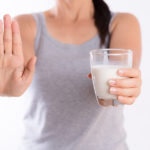By David Blyweiss, M.D., Advanced Natural Wellness
August 7, 2015
- Milk is great… If you’re a baby cow
- Is this why bone fractures are on the rise?
- Rich, creamy and delicious alternatives to milk
A lot of my patients drink milk every day to get their share of calcium. And I’ll tell you the same thing I tell them…
If you’re a baby cow, milk is the best stuff on earth. But if you’re a human, you’d be much better off without it.
You see, every mammal’s milk is specifically designed for its young. So unless you want the massive girth and weight of a cow, I don’t suggest you drink the milk that’s designed to make them that way.
Worse yet, the inclusion of growth hormones and antibiotics make cow’s milk an even less appealing choice for humans.
Milk cows are loaded up with antibiotics that cause the spread of antibiotic-resistant strains of bacteria. And they’re pumped full of synthetic hormones (rBGH) to increase milk production. This hormone is just one amino acid away from human growth hormone.
Plus, dairy farmers normally feed cattle a genetically modified diet, which is passed on to you when you drink cow’s milk.
Now here’s the thing. Even if you drink organic milk, I still don’t recommend it.
The USDA’s dietary guidelines recommend we all drink two to three cups of milk a day. But I don’t believe these recommendations are based on any scientific research that says milk is good for us. Research doesn’t even show that it supports bone health, let alone any other health benefit.
MD Exposes the Hidden Danger to Your Eyes

When your eyesight starts to fail, it's a real problem. Suddenly you can't go to the grocery store... you can't get to the doctor if you have an emergency... you can't meet your friends for dinner…
Your "regular" doctor doesn't have time to keep up with the latest research. And the same goes for eye doctors. They go to school to learn how to fit you for glasses and contacts, but have no way of preventing the damage and loss of eyesight that threatens your freedom and independence.
Let me show you something that explains a LOT about how your eyes work.
In my FREE Special Report, I'll show you a HUGE, untapped resource for your eyes that safely and naturally restores clear, effortless eyesight.
Click here to get started...
Instead, the USDA’s recommendations are more likely based on the fact that milk is fortified with vitamins A and D.
Now you can fortify milk with whatever you want. But the fact is we humans were never meant to consume milk from cattle. And while you might find it surprising, the animal protein found in milk may actually deplete the amount of calcium in your body…
If you’ve been drinking milk to shore up your bone health, it may be time to think again. Because there’s something we’ve known for years… and nobody is telling you about it.
Consuming cow milk may actually weaken your bones!
You’re probably thinking I’ve gone off the deep end here. But it’s the absolute truth.
For example, a 1994 study found that when people over the age of 20 drank milk, they had more hip fractures in their older years.
And what about the 1997 results from the 12-year Harvard Nurses’ Health Study?
The researchers found no evidence that higher intakes of milk reduced the chance of bone fractures. In fact, the women who drank two or more glasses a day of milk had a greater risk of hip fracture than those who drank a glass or less each week.
Plus, in 2003 a combined effort between the Brigham Women’s Hospital and Harvard Medical School revealed that drinking milk didn’t lower the risk of hip fracture.
Sadly enough, that’s not even the bad news!
Further research finds women with the highest intakes of lactose (about what you would get from three cups of milk each day) have a higher risk of ovarian cancer compared to women with the lowest intakes.
And it’s just as bad for men.
Are You Suffering From...
- Love handles and a pot belly
- Romance that isn't what it used to
- Forgetfulness and inattention
- Low (or no) strength and endurance
- A sex drive that's shifted into neutral...or worse
If so...you may have Mature Male Burnout. Click here to discover more about this unique condition and what you can do about it.
In a Harvard study of male health professionals, men who drank two or more glasses of milk a day were almost twice more likely to develop advanced prostate cancer than those who didn’t drink milk at all.
The link was so strong the study authors stated “Per capita milk consumption correlated more highly with national rates of prostate cancer mortality than other foods rich in animal fats and cholesterol.”
I could go on and on, but I think you get the point.
We’ve known – for quite a long time now – that drinking cow’s milk does nothing for bone health. And it may even be dangerous to us humans.
So what should you drink instead?
If you were brought up drinking milk, chances are good it’s still a big part of your diet. And the idea of giving it up might be a little hard to swallow (no pun intended.)
But there are several alternatives to milk that can provide much better health consequences. And several of them are just as white, creamy and frothy as a freshly poured glass of Borden’s or McArthur’s.
My personal favorite is almond milk. You might think it would taste nutty, but it really doesn’t. It’s surprisingly rich and creamy, yet still has a lower fat and calorie content than cow’s milk. Almond milk contains just as much calcium per cup as milk does and also has healthy doses of potassium, vitamin E and vitamin D.
Another nutty milk you might try is unsweetened coconut milk. However I don’t recommend drinking large quantities of it because it is a very high calorie form of milk. But it is low in sodium and doesn’t have cholesterol.
It also has a high saturated fat content which, according to some, is a “healthier” saturated fat than other sources. But I haven’t seen the data confirming this, so moderation is key.
While almond milk is my first choice, neither it nor coconut milk will work for anyone who is allergic to nuts.
Thankfully there are a couple of other options that may fulfill your needs.
Rice milk isn’t nearly as thick as almond milk and it’s lacking in protein. However, it has almost as much calcium per serving. Plus you’ll get a little vitamin A, D and B12 in every glass you drink. So it’s still a much healthier alternative than drinking cow’s milk.
And there’s one more milk that’s recently made its debut, but I haven’t tried it yet.
It’s hemp milk. From what I hear its consistency and creaminess is similar to regular dairy milk. And the nutrient content is similar to that of almond milk. So it’s certainly worth a try.
One thing to keep in mind when choosing a milk alternative is to stay away from the flavored and sweetened versions of them. For the biggest health benefit, select the original, unsweetened form.
In the end, you don’t have to give up the thick, rich creaminess you crave. You simply need to re-discover it in a healthier and more natural form that your human body can really make use of.
And if you feel you absolutely need a glass of cow’s milk, go 100% organic to avoid exposure to GMOs and hormones.
Sources:
Cumming RG, Klineberg RJ. Case-control study of risk factors for hip fractures in the elderly. Am J Epidemiol. 1994 Mar 1;139(5):493-503.
Feskanich D, Willett WC, Stampfer MJ, Colditz GA. Milk, dietary calcium, and bone fractures in women: a 12-year prospective study. Am J Public Health. 1997 Jun;87(6):992-7.
Feskanich D, Willett WC, Colditz GA. Calcium, vitamin D, milk consumption, and hip fractures: a prospective study among postmenopausal women. Am J Clin Nutr. 2003 Feb;77(2):504-11.
Genkinger JM, Hunter DJ, Spiegelman D, et al. Dairy products and ovarian cancer: a pooled analysis of 12 cohort studies. Cancer Epidemiol Biomarkers Prev. 2006; 15:364–72.
Giovannucci E, Rimm EB, Wolk A, et al. Calcium and fructose intake in relation to risk of prostate cancer. Cancer Res. 1998; 58:442–447.






